GST Registration
The Goods and Services Tax (GST) is a tax on goods and services consumed in India. GST is an indirect tax that has replaced many other indirect taxes in India, such as excise duty, VAT, and services tax. GST has been in force from 1st July, 2017 based on the Goods and Service Tax Act passed by the Indian Parliament on March 29, 2017.
Taxable person under GST
A ‘taxable person’ under the GST Act is someone who conducts business in India and is registered or needs to be registered under the GST Act. A taxable person can be an individual, HUF, company, firm, LLP, an AOP/ BOI, any corporation or Government company, body corporate incorporated under the laws of a foreign country, co-operative societies, local authorities, governments, trusts, or artificial juridical persons.
GST Registration Turnover Limit
GST registration can be obtained voluntarily by any person or entity irrespective of turnover. GST registration becomes mandatory if a person or entity sells goods or services beyond a certain turnover.
Service Providers: Any person or entity who provides service of more than Rs.20 lakhs in aggregate turnover in a year is required to obtain GST registration. In special category states, the GST turnover limit for service providers has been fixed at Rs.10 lakhs.
Goods Suppliers: As per notification No.10/2019 any person who is engaged in the exclusive supply of goods whose aggregate turnover crosses Rs.40 lakhs in a year is required to obtain GST registration. To be eligible for the Rs.40 lakhs turnover limit, the supplier must satisfy the following conditions:
If the above conditions are not met, the supplier of goods would be required to obtain GST registration when the turnover crosses Rs.20 lakhs and Rs.10 lakhs in special category states.
Special Category States: Under GST, the following are listed as special category states – Arunachal Pradesh, Assam, Jammu and Kashmir, Manipur, Meghalaya, Mizoram, Nagaland, Sikkim, Tripura, Himachal Pradesh and Uttarakhand.
Aggregate Turnover: Aggregate turnover = (Taxable supplies + Exempt Supplies + Exports + Inter-State Supplies) – (Taxes + Value of Inward Supplies + Value of Supplies Taxable under Reverse Charge + Value of Non-Taxable Supplies).
Aggregate turnover is calculated based on the PAN. Hence, even if one person has multiple places of business, it must be summed to arrive at the aggregate turnover.
Types of GST Registration
There are various types of GST registration like regular, casual taxable persons, non-resident taxable persons and eCommerce operators. Casual taxable persons, non-resident taxable persons and eCommerce operators are required to obtain GST registration irrespective of turnover limit.
Casual Taxable Persons: The GST Act defines as a casual taxable person as a person who occasionally supplies goods or services in a State or a Union territory where the entity has no fixed place of business. Hence, persons running temporary businesses in fairs or exhibitions or seasonal businesses would fall under casual taxable person under GST.
Non-resident Taxable Persons: Non-resident taxable person (NRI) under GST is any person or business or not-for-profit supplying goods or services but have no fixed place of business or residence in India. Thus, any foreign person or foreign business or organisation supplying goods or services to India would be a non-resident taxable person – requiring compliance with all GST regulations in India.
E-Commerce Operators: Electronic commerce operator is every person who, owns, operates or manages digital or electronic facility or platform for electronic commerce. Thus, any person selling through the internet can be termed as an eCommerce Operator requiring GST registration irrespective of business turnover.
What is GSTIN?
GSTIN or Goods and Services Tax Identification Number (GSTIN) is provided to entities having GST registration number. GSTIN is 15 characters in length. The allocation of GSTIN is based on PAN and State of the applicant. In a GST registration number, the first two digits represent the State Code. The following next 10 digits represent the PAN of the applicant.
Download GST Registration Certificate
GST Certificate is issued to people who are registered under GST. Those are having GST registration certificate are mandatorily required to display the registration certificate prominently at their place of business. Downloading GST certificate is a pretty easy process through the GST Portal. Login to the GST Account and and go to User Services. In User Services, click on View / Download Certificate to download GST registration certificate.
Register for GST through Mera Online CA
You can obtain your GST registration through Mera Online CA in less than 7 working days. Enter your name, phone number and email to being the process.
When we receive your request a GST expert will reach out to you and understands your business activity, the state where the business is operating and answer any questions that you may have.
The GST expert will also collect and verify the documents required to obtain GST registration. Once the payment is initiated we start with the GST registration process and we upload all your application into the GST Portal.
You obtain the GST registration within 3 to 7 working days. Everything is completely online you don’t need to be physically present at the office for the same. Along with the GST registration, access is provided to LEDGERS Platform for your to do GST invoicing and GST return filing.
Voluntary GST Registration
Any person or entity that wishes to supply goods or services can obtain GST registration voluntarily, irrespective of business turnover. Voluntarily obtaining GST registration can help the business avail Input Tax Credit and also provide GST bill to customers.
Penalty for NOT Obtaining GST Registration.
Any person or entity that crosses the aggregate turnover limit must obtain GST registration within 30 days of becoming liable to obtain GST registration. Delay or non-compliance can lead to a penalty of Rs. 10,000 and loss of input tax credit during the period of delay.
Documents Required for GST Registration
| Sole proprietor / Individual | |
| LLP and Partnership Firms | |
| HUF | |
| Company (Public and Private) (Indian and foreign) |
Benefits of GST Registration
The following are some of the advantages of GST registration:
Bank Loans: GST registration and GST return filing serve as proof of business activity and create track record for a business. Banks and NBFCs lend to businesses based on GST return data. Hence, GST registration can help you formalize your business and get credit.
Supplier Onboarding: To become a supplier of reputed companies, GST registration is often times a must during the supplier onboarding process. Hence, GST registration can help you get more business.
eCommerce: GST registration is a must to sell online and through various platforms like Amazon, Flipkart, Snapdeal, Zomato, Swiggy, etc., Hence, having a GST registration will allow you to sell online.
Input Tax Credit: Entities having GST registration are eligible to collect GST from customer for the supply and offset the liability against GST taxes paid while purchasing various goods and services. Hence, GST registration can help you save on taxes and improve margins.

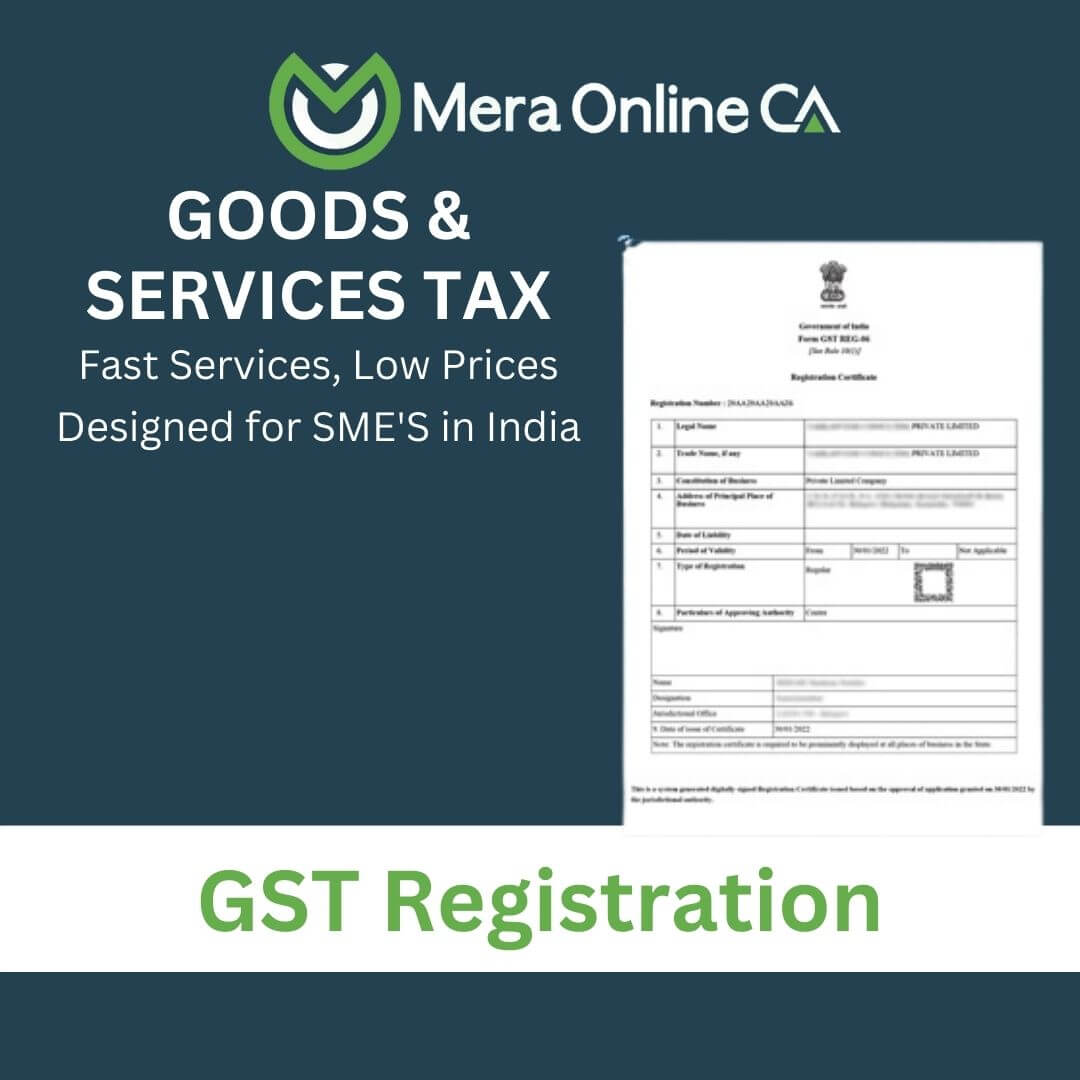
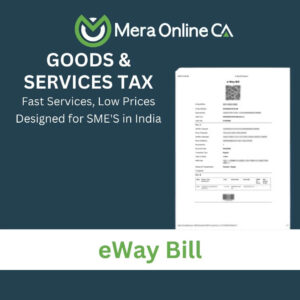
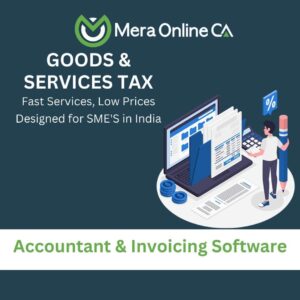
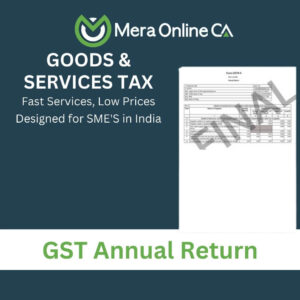
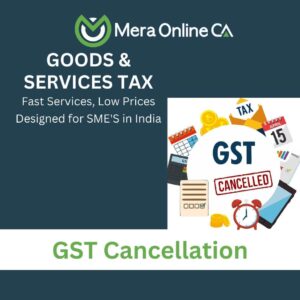
1. What is a GST certificate in India?
24 March 2023
A Goods and Services Tax (GST) certificate is a document issued by the Indian government that certifies that a business is registered with the Goods and Services Tax (GST) system. It is a unique identification number that is used to identify a business for taxation purposes in India.
2. Who needs GST certificate?
24 March 2023
Any business that is registered for GST with the Indian government must have a GST certificate. This applies to both online and offline businesses.
3. Is GST certificate compulsory?
24 March 2023
Yes, in India, businesses must obtain a GST certificate in order to be registered for GST. Without a GST certificate, businesses will not be able to charge GST on the goods and services they sell.
4. What is the minimum limit for GST registration?
23 February 2023
Businesses with an annual turnover of more than Rs. 40 lakhs are required to register for GST. However, this limit is lower for businesses in certain special category states, such as Arunachal Pradesh, Manipur, and Nagaland. Also, there are different rules for businesses involved in e-commerce, which may have to register for GST regardless of their turnover.
Read our article to find more details on turnover limit for GST Registration.
5. Can a person with no GST registration collect GST?
08 December 2021
No, only persons registered under GST are allowed to collect GST from the customers. A person not registered under GST cannot even claim the input tax credit on the GST paid.
6. What is an E-way bill?
16 November 2021
An E-way bill is an electronic document which serves as an evidence to the movement of goods having a value of more than Rs. 50,000. It available to a supplier or an individual transporting goods. It has two components; Part A, with details such a GSTIN of the supplier and recipient, place of delivery, value of goods, HSN code, reason for transportation and part B, with details of the vehicle and transport documents.
7. What are the benefits of an Eway bill?
08 December 2021
It is a wholly digital interface that eliminates the need for state boundary checks. It will facilitate faster movement of goods and improve the turnaround time of trucks thus reducing costs for the supplier.
8. When should an e-way bill be generated?
08 December 2021
As per rule 138 of the CGST Rules, 2017, an e-way bill has to be generated prior to the commencement of the transport of goods.
9. Is it mandatory to generate an e-way bill?
08 December 2021
It is mandatory to generate E Waybill in all cases wherein the value of consignment is more than Rs. 50,000. However, it is not necessary to generate one wherein the goods are being transported by a non- motorized conveyance or if they are being transported from the port, airport, air cargo complex, and land customs station for clearance by customs.
10. What is the penalty for not generating an E-way bill?
16 November 2021
Any taxable person who transports any goods without the cover of specified documents (e-way bill is one of the specified documents) shall be liable to pay a penalty of Rs. 10,000 or the amount of tax sought to be evaded (whichever is higher).
11. What is a Composition scheme?
08 December 2021
Small businesses registered under the GST composition scheme can pay GST at a fixed rate of turnover every quarter and file quarterly GST returns. Composition levy would generally be related to small taxpayers who are supplying goods and services or both to the end consumer with a lower turnover.
12. What are the eligibility criteria?
08 December 2021
Any existing taxpayer whose annual turnover did not cross the Rs.1.5 crore threshold in the preceding financial year. However, service providers with the exception of restaurants and caterers are not eligible, neither are casual taxable persons nor non-resident Indians.
13. Can Input tax credit be claimed under the composition scheme?
08 December 2021
No input tax credit cannot be claimed by a dealer opting for a composition scheme as he is out of the credit chain. He cannot take credit for his input supplies.
14. How long will the scheme be valid?
16 November 2021
The validity of the composition scheme will depend upon the option exercised by a taxable person as long as all the conditions are fulfilled as specified in the law. However, individuals who are eligible for the scheme can calso hoose to opt-out of it by simply filing an application
15. How will the aggregate turnover be computed?
08 December 2021
It will be computed on an all-India basis and will include the value of all taxable supplies. It would exclude inward supplies under reverse charge as well as central, state/union territory and Integrated taxes and cess.
16. What is inter-state supply?
08 December 2021
Inter-state supply of goods or service is when the supply location is a different state from the delivery location. In addition, the inter-state supply applies to the supply of goods or services by an SEZ unit or the export of goods or services.
17. What is intra-state supply?
08 December 2021
An intra-state supply of goods or services applies when the place of supply is in the same state as the location of the supplier. Intra-state supply does not include the supply of goods/services to SEZ units or developers, imports, or exports.
18. What is SGST?
08 December 2021
As per the SGST Act, the State GST or SGST applies to intra-state supplies of goods and services. It is administered by the respective state government. SGST liability can be set off against SGST or IGST input tax credit only.
19. What is CGST?
08 December 2021
Central GST or CGST would be levied under the CGST Act on the intra-state supplies of goods and services. Hence in the case of intra-state supplies of goods and services, both the central and state government would combine their levies with an appropriate revenue sharing agreement between them.
20. What is IGST?
08 December 2021
Integrated GST or IGST is the tax levied under the IGST Act on the supply of any goods and services in the course of inter-state trade across India. Further, IGST would include any supply of goods and services in the course of import into India and the export of goods and services from India.
21. What is the deadline for getting registered under GST?
23 February 2023
An entity liable to be registered under GST should apply for registration within 30 days of meeting the criteria. Casual taxable persons and non-resident taxable persons are required to be registered under GST prior to commencing business.
22. Who is the primary authorized signatory?
23 February 2023
The primary authorized signatory is the person who is primarily responsible to undertake tasks on the GST portal on behalf of the taxpayer. It could be the promotion of the business or any other trustworthy person nominated by the promoters of the business.
23. Is PAN mandatory for obtaining GST registration?
23 February 2023
Yes. PAN is mandatory for obtaining GST registration. In the case of proprietorship, the PAN of the proprietor can be used. In the case of LLP or Company or Trust or other types of a legal entity, PAN must first be obtained for the entity. However, PAN is not mandatory for the GST registration of foreigners and foreign companies. For non-resident taxable persons, GSTIN with a fixed expiry date will be provided based on the other documents provided to prove existence.
24. What is the validity of GST registration?
23 February 2023
GST registration does not have an expiry date. Hence, it will be valid until it’s cancelled, surrendered or suspended.Only GST registration for non-resident taxable persons and casual taxable persons have a validity period that is fixed by the authorities while issuing the GST registration certificate.
25. How to apply for GST number?
22 March 2023
Click on the “Register Now” option on the official GST website. Select the appropriate registration form from the list and fill in the relevant details and submit. Once the form is submitted, the GST number will be issued.
For more details on how to apply for GST number, refer to our article.
26. Who is eligible for GST registration?
22 March 2023
Any business that supplies taxable goods and services and whose turnover exceeds the GST registration threshold, which is currently set at Rs. 40 lakhs, must register for GST. Other businesses eligible for GST registration include those engaged in e-commerce activities, inter-state supply of goods, and providing services to someone in a different state.
Refer to this article to learn more about the GST eligibility criteria.
27. What are the fees for GST registration?
22 March 2023
Using the GST Registration Portal to register a business is free of charge. The entire procedure is free and conducted online.
Click here for more details regarding GST Registration fees.
28. What is compulsory registration under GST?
24 March 2023
Compulsory registration under GST means that any business entity that is supplying taxable goods or services and whose turnover exceeds the threshold limit as prescribed by the government must obtain a GST registration.
29. What is the limit for GST registration?
24 March 2023
The threshold limit for GST registration is Rs. 40 lakhs for most states in India. However, some special category states have a lower threshold limit of Rs. 10 lakhs.
30. What is the fees of GST registration?
24 March 2023
The process of GST registration is free of cost on the official GST Portal.